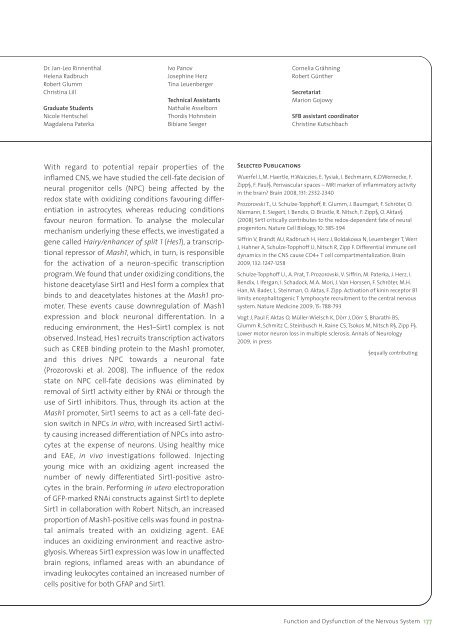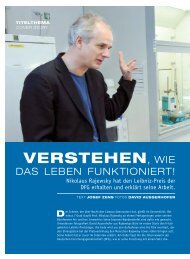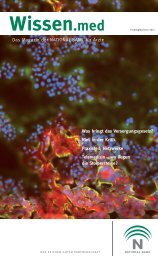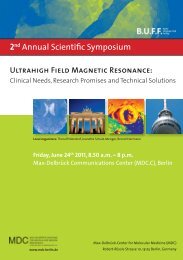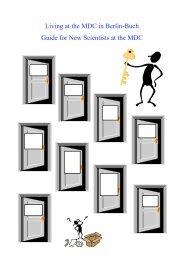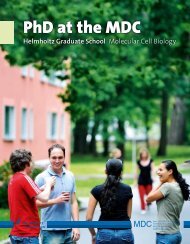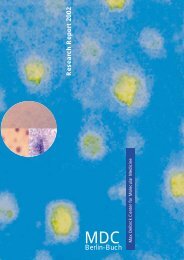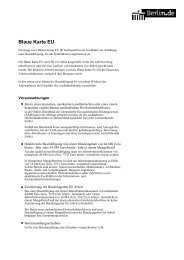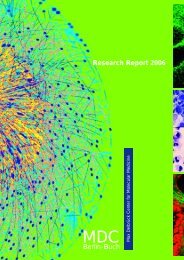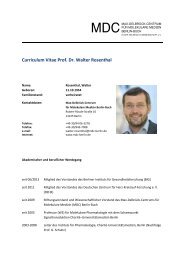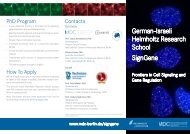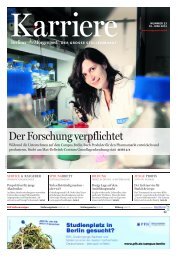Research Report 2010 - MDC
Research Report 2010 - MDC
Research Report 2010 - MDC
You also want an ePaper? Increase the reach of your titles
YUMPU automatically turns print PDFs into web optimized ePapers that Google loves.
Dr. Jan-Leo RinnenthalHelena RadbruchRobert GlummChristina LillGraduate StudentsNicole HentschelMagdalena PaterkaIvo PanovJosephine HerzTina LeuenbergerTechnical AssistantsNathalie AsselbornThordis HohnsteinBibiane SeegerCornelia GrähningRobert GüntherSecretariatMarion GojowySFB assistant coordinatorChristine KutschbachWith regard to potential repair properties of theinflamed CNS, we have studied the cell-fate decision ofneural progenitor cells (NPC) being affected by theredox state with oxidizing conditions favouring differentiationin astrocytes, whereas reducing conditionsfavour neuron formation. To analyse the molecularmechanism underlying these effects, we investigated agene called Hairy/enhancer of split 1 (Hes1), a transcriptionalrepressor of Mash1, which, in turn, is responsiblefor the activation of a neuron-specific transcriptionprogram.We found that under oxidizing conditions, thehistone deacetylase Sirt1 and Hes1 form a complex thatbinds to and deacetylates histones at the Mash1 promoter.These events cause downregulation of Mash1expression and block neuronal differentation. In areducing environment, the Hes1–Sirt1 complex is notobserved. Instead, Hes1 recruits transcription activatorssuch as CREB binding protein to the Mash1 promoter,and this drives NPC towards a neuronal fate(Prozorovski et al. 2008). The influence of the redoxstate on NPC cell-fate decisions was eliminated byremoval of Sirt1 activity either by RNAi or through theuse of Sirt1 inhibitors. Thus, through its action at theMash1 promoter, Sirt1 seems to act as a cell-fate decisionswitch in NPCs in vitro, with increased Sirt1 activitycausing increased differentiation of NPCs into astrocytesat the expense of neurons. Using healthy miceand EAE, in vivo investigations followed. Injectingyoung mice with an oxidizing agent increased thenumber of newly differentiated Sirt1-positive astrocytesin the brain. Performing in utero electroporationof GFP-marked RNAi constructs against Sirt1 to depleteSirt1 in collaboration with Robert Nitsch, an increasedproportion of Mash1-positive cells was found in postnatalanimals treated with an oxidizing agent. EAEinduces an oxidizing environment and reactive astroglyosis.Whereas Sirt1 expression was low in unaffectedbrain regions, inflamed areas with an abundance ofinvading leukocytes contained an increased number ofcells positive for both GFAP and Sirt1.Selected PublicationsWuerfel J.,M. Haertle, H.Waiczies, E. Tysiak, I. Bechmann, K.D.Wernecke, F.Zipp§, F. Paul§. Perivascular spaces – MRI marker of inflammatory activityin the brain? Brain 2008, 131: 2332-2340Prozorovski T., U. Schulze-Topphoff, R. Glumm, J. Baumgart, F. Schröter, O.Niemann, E. Siegert, I. Bendix, O. Brüstle, R. Nitsch, F. Zipp§, O. Aktas§(2008) Sirt1 critically contributes to the redox-dependent fate of neuralprogenitors. Nature Cell Biology, 10: 385-394Siffrin V, Brandt AU, Radbruch H, Herz J, Boldakowa N, Leuenberger T, WerrJ, Hahner A, Schulze-Topphoff U, Nitsch R, Zipp F. Differential immune celldynamics in the CNS cause CD4+ T cell compartmentalization. Brain2009, 132: 1247-1258Schulze-Topphoff U., A. Prat, T. Prozorovski, V. Siffrin, M. Paterka, J. Herz, I.Bendix, I. Ifergan, I. Schadock, M.A. Mori, J. Van Horssen, F. Schröter, M.H.Han, M. Bader, L. Steinman, O. Aktas, F. Zipp. Activation of kinin receptor B1limits encephalitogenic T lymphocyte recruitment to the central nervoussystem. Nature Medicine 2009, 15: 788-793Vogt J, Paul F, Aktas O, Müller-Wielsch K, Dörr J, Dörr S, Bharathi BS,Glumm R, Schmitz C, Steinbusch H, Raine CS, Tsokos M, Nitsch R§, Zipp F§.Lower motor neuron loss in multiple sclerosis. Annals of Neurology2009, in press§equally contributingFunction and Dysfunction of the Nervous System 177


